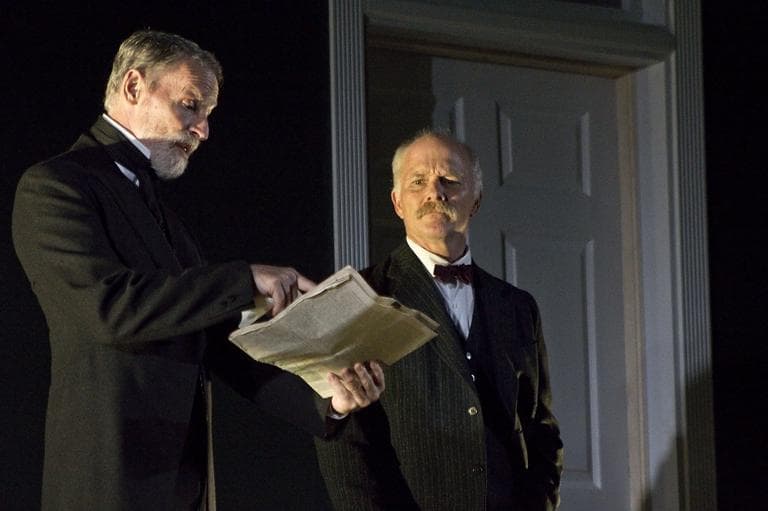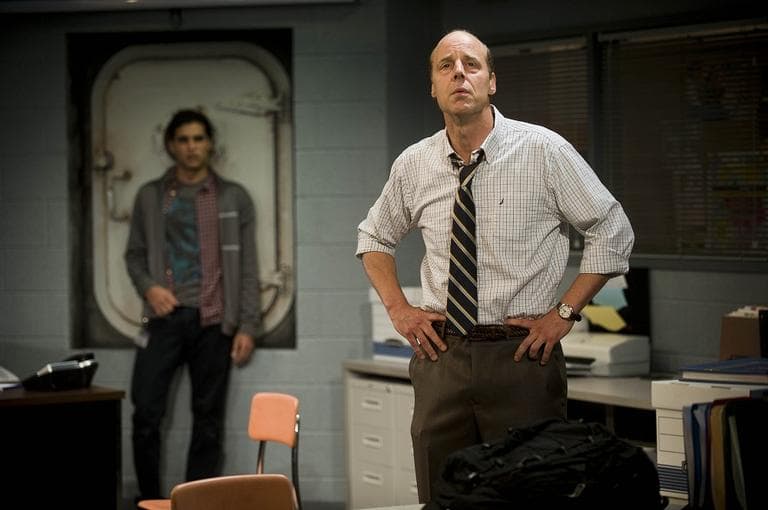Advertisement
Berkshires Roundup: Dukakis Needs To Be More Tempestuous

If I were to list the 20 most enjoyable Shakespeare productions I’ve seen, about half of them would be by Shakespeare & Company, the Berkshires-based troupe. The company is known, among other things, for teaching its actors to speak with a natural voice rather than, say, a faux Olivier-Gielgud accent. The result is almost always Shakespeare performed with uncanny clarity and sometimes with the transcendent beauty that comes when directorial inspiration meets the genius of the author’s words.
Its latest production of “The Tempest” (through Aug. 19) directed by the company’s leader, Tony Simotes, falls one step short of the company’s gold standard. The one step, alas, is in the performance of the woman who taught Simotes and some of the actors a thing or two at NYU some decades ago.
What is it about playing Shakespearean characters that makes Olympia Dukakis so depressed? Shakespearean men, in particular. When she played the title role in “The Lear Project” for Shakespeare & Company about 15 years ago she was such a miserable human being that you rooted for Regan and Goneril. Now, as the transgendered Prospera for the same company, she cuts such a dour figure that she makes you root for the monster, Caliban – partly because he’s played so stunningly by another of her former students, Rocco Sisto.
Since the late ‘60s performances of “The Tempest” have listed toward a less sympathetic Prospero, the Duke of Milan who’s overthrown by his brother and sets up shop on an island where, by use of magic, he enslaves Caliban, the rightful heir and also orders the spirit, Ariel, to do his bidding.
As the transgendered Prospera, Olympia Dukakis cuts such a dour figure that she makes you root for the monster, Caliban – partly because he’s played so stunningly by one of her former students, Rocco Sisto.
It’s easier to see, then, why directors have adopted an anti-colonialist approach in their interpretations, including the sensational 1995 Public Theater production directed by George C. Wolfe and starring Patrick Stewart.
Dukakis and, presumably, Simotes seem to be more into demonstrating the dehumanizing aspects of revenge and the opposite virtues of forgiveness. That’s in Shakespeare, too, even though I doubt he was quite as PC as Shakespeare & Company often make him out to be. My guess is he took quite a bit of pleasure in Prospero’s revenge.
Dukakis has none of that. She’s like the crazy aunt in the attic, nagging and nattering and otherwise getting on every other character’s nerves. No wonder her brother got rid of her. And those other characters are played to near-perfection, mostly by the Shakespeare & Company all-stars led by the superlative Sisto; a sensual Kristin Wold as Ariel; and the soulful Merritt Janson as Prospero’s daughter, Miranda. The whole cast is in sync including Dukakis’s brother, Apollo Dukakis, though Jonathan Epstein could be a little less drunk as the king’s butler, Stephano.
Simotes is a master of physicality and pageantry, both of which are on display in the production. I’m not sure what he gets by setting it in the Mediterranean in the ‘40s, unless he’s trying to say something about the authoritarianism of the age. But there’s one thing he loses by featuring Prospera as such a drab figure. Prospero is something of a stand-in for the playwright creating theatrical magic. Here his final soliloquy creating that bond doesn’t even make it onto the stage. Prospero is not a negative figure – even in Wolfe’s anti-colonial production – and to fit Prospera into such a straitjacket undermines too much of the magic that the rest of the company pours into this production.
Edith

The world premiere of “Edith” by Berkshire Theatre Group (through Aug. 11 on the Fitzpatrick Stage in Stockbridge) centers on the second wife of Woodrow Wilson and how she supposedly ran the country after his debilitating stroke in 1919 as the Republicans under Henry Cabot Lodge were attempting to undermine his bid to join the League of Nations. In the eyes of many this made her “the secret president.”
Playwright Kelly Masterson deserves credit for dramatizing the events, but leaves you wondering to what purpose. The implication is that Mrs. Wilson, the former Edith Galt, was praiseworthy for trying to keep her husband’s vision of the League intact and not compromising with Lodge, who demanded that the U.S. be free to declare or end war on its own rather than go along with Europe. Masterson makes him into pretty much a stick figure bad guy who prevented the League from winning approval in the Senate, all of which feeds into the Democratic bias of most theater audiences.
It’s hard, though, to muster much love for either Edith or her husband in this dynamic. The “peace-loving” Wilson did lead us into World War I and his inability to convince Europe to refrain from crippling wartime reparations led directly to the rise of Adolf Hitler. Plus, Edith’s refusal to let either his staff or Lodge see him during this time and not turn the reins of government over to Vice President Thomas Marshall were ethically and constitutionally suspect. If Nancy Reagan had done the same thing she would have been pilloried.
Director Michael Sexton keeps the action moving forward nicely, thanks in part to a flexible set by Brett J. Banakis and a strong cast headed by Jayne Atkinson and Jack Gilpin as the Wilsons. That “Edith” fails to leave much of an impression isn’t their fault.
The North Pool

Rajiv Joseph created a mild sensation last year with “Bengal Tiger at the Baghdad Zoo,” a Pulitzer finalist about the Iraq war fueled by Robin Williams in the title role. This 2011 two-man play is more modest. A high school vice principal calls in an Arabic student for some unknown reason. He shoots the breeze about nothing of much consequence but slowly builds to something terrible that had happened at the school.
The Barrington Stage Company production (at the St. Germain Stage down the road from the main stage in Pittsfield through Aug. 11) does an excellent job building the tension between the two men with full-bodied performances by Remi Sandri as Vice Principal Danielson and Babak Tafti as Khadim. Khadim is not as innocent as he seems and Danielson’s attempt to get the truth out of him recalls Hank Schrader’s interrogations in “Breaking Bad.” Is Khadim a terrorist? Or are we stereotyping? Is the vice principal concerned only with keeping students safe? Or is there a dark side to his actions?
But Joseph’s cat and mouse games ultimately feel a little too manipulative, both tactically on the part of the vice principal and artistically on the part of the playwright. Nor does it seem like the stakes are as high as they should be, leading Joseph into territory that proves too melodramatic by play’s end.
Nevertheless, Joseph has a distinctive voice and a sharp ear for the way young people lead their lives. Company One is doing “Bengal Tiger at the Baghdad Zoo” in October. Sounds like a must-see.
This program aired on August 9, 2012. The audio for this program is not available.
